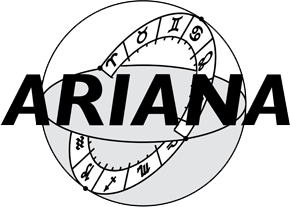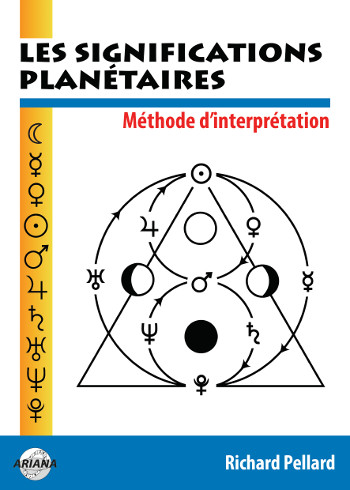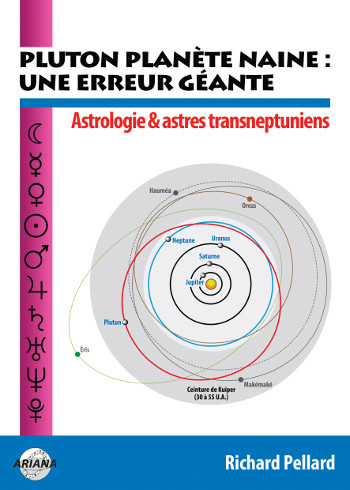Your Planets
Portraits of the Planets
Aspects between Planets
The planetary ages
The planetary families
Planets in Signs
The Planets in comics


The interpretation examples that we are suggesting are very far from being exhaustive : they only show and outline a general frame describing the issues of the aspect. They should therefore not be taken literally. Each being brings indeed its own responses, more or less original, to the questions raised by an aspect. There is no magic formula. Through using the R.E.T. and the Theory of Ages and combining logic, observation and imagination, you will be able to develop a thousand other possible meanings, a thousand other variations on the same theme.
“tR-rE” issue (transcendance of Representation & representation of Existence). How to blend switching from the unique to the multiple (Mercury ‘tR’) with switching from the duo-duel to the unique (Jupiter ‘rE’)? How to operate together a scattered curiosity and an ambitious pragmatism? How to stay flippant while building an exemplary way of life? This aspect excludes levels ‘e’ (affective sensoriality) and ‘T’ (prospective imagination).
You are hyper-gifted for language and communication. Curious, open to different points of view, relaxed, you know how to convince your interlocutors at the same time of the validity of your pragmatic certainties, your realistic affirmations, your object lessons. Skillful and eloquent, negotiator, you know how to conduct debates with liveliness, eloquence and humour, in the best of your interests and your brand image. You adapt and conform flexibly to the norms and models regulating life in society without losing any of your lightness, your imagination, your natural freedom, your spontaneous curiosity. Reasonable, ambitious and organized, you don’t take yourself too seriously : you know how to laugh at the rewarding responsibilities that you like to take on. Your humor remains within the accepted norms and forms : cheerful but not disturbing, it aims to alleviate social constraints, and not to contest them in depth.
Balanced dissonance : you switch alternately from an all-round communicative openness (Mercury) to an ambitious pragmatism (Jupiter), without being able to bring yourself to choose. Depending on whether one or the other function dominates in your experience, you can adopt the following attitudes :
If and when Mercury dominates : whimsical, dispersed or inconsistent, you challenge or refuse any reasonable standard, any sensible judgment, any object lesson. You talk to say nothing, and above all nothing important, official, solemn. You make fun of what seems important to others or strikes at the corner of common sense, make fun of the elementary rules of life in good society. Your verbose imagination develops against your interests and material ambitions. You ask yourself a thousand questions without being able to bring them any pragmatic conclusion. You distract yourself too easily from heavy social obligations and prefer to clown around or be dazed rather than assume the agreed role that is expected of you. Irresponsible, you do not take any conformism seriously, which not only is not appropriate, but also prevents anyone from placing the slightest trust in you.
If and when Jupiter dominates : polarized by your ambitions, your quest for tangible power, or your overly reasonable view of the world, you cannot or do not want to open your mind to anything else. No question for you of useless encounters, of gratuitous curiosities, of marvelous discoveries : it has to pay off, that you derive concrete benefits or obvious usefulness from it. Wanting to be definitive, your sweeping judgments prevent you from any plurality of hypotheses, any change of point of view. By dint of wanting to have the merits of your acts and productions recognized, you tragically forget not to take yourself seriously. Your desire to be an exemplary representative of your group pushes you to blindly sacrifice your individual freedom, your irreverent fantasy, your spontaneity without blinkers. You pontificate at the expense of all humor.
If you learned to control this dissonance, you know that there is a time for amusing discoveries and a time for the satisfaction of your concrete ambitions, and know how to flawlessly alternate these two functions.
If you managed to sublimate this dissonance, you have deliberately sacrificed any material and social opportunism for the sake of your insatiable intellectual curiosity ; or you have abdicated any intellectual whim in favour of the management of your pragmatic interests.
▶ Introduction aux significations planétaires
▶ The Mercurian: Psychological profile
▶ The mercurian function ‘tR’ (transcendence of Representation)
▶ Mercurian stage (from 1 to 3 months old): the age of communication
▶ Sun-Mercury-Venus: extensive Representation
▶ Mercury-Saturn-Pluto: intensive transcendence
▶ The Jupiterian: Psychological profile
▶ The jupiterian function ‘rE’ (representation of Existence)
▶ Jupiterian stage (from 2 to 12 years old): the age of socialization
▶ Mars-Jupiter-Saturn: extensive Existence
▶ Sun-Jupiter-Uranus: intensive representation
▶ À propos d’un transit de Jupiter…

Les significations planétaires
par
620 pages. Illustrations en couleur.
La décision de ne traiter dans ce livre que des significations planétaires ne repose pas sur une sous-estimation du rôle des Signes du zodiaque et des Maisons. Le traditionnel trio Planètes-Zodiaque-Maisons est en effet l’expression d’une structure qui classe ces trois plans selon leur ordre de préséance et dans ce triptyque hiérarchisé, les Planètes occupent le premier rang.
La première partie de ce livre rassemble donc, sous une forme abondamment illustrée de schémas pédagogiques et tableaux explicatifs, une édition originale revue, augmentée et actualisée des textes consacrés aux significations planétaires telles qu’elles ont été définies par l’astrologie conditionaliste et une présentation détaillée des méthodes de hiérarchisation planétaire et d’interprétation accompagnées de nombreux exemples concrets illustrés par des Thèmes de célébrités.
La deuxième partie est consacrée, d’une part à une présentation critique des fondements traditionnels des significations planétaires, d’autre part à une présentation des rapports entre signaux et symboles, astrologie et psychologie. Enfin, la troisième partie présente brièvement les racines astrométriques des significations planétaires… et propose une voie de sortie de l’astrologie pour accéder à une plus vaste dimension noologique et spirituelle qui la prolonge et la contient.
Téléchargez-le dès maintenant dans notre boutique

Pluton planète naine : une erreur géante
par
117 pages. Illustrations en couleur.
Pluton ne fait plus partie des planètes majeures de notre système solaire : telle est la décision prise par une infime minorité d’astronomes lors de l’Assemblée Générale de l’Union Astronomique Internationale qui s’est tenue à Prague en août 2006. Elle est reléguée au rang de “planète naine”, au même titre que les nombreux astres découverts au-delà de son orbite.
Ce livre récapitule et analyse en détail le pourquoi et le comment de cette incroyable et irrationnelle décision contestée par de très nombreux astronomes de premier plan. Quelles sont les effets de cette “nanification” de Pluton sur son statut astrologique ? Faut-il remettre en question son influence et ses significations astro-psychologiques qui semblaient avérées depuis sa découverte en 1930 ? Les “plutoniens” ont-ils cessé d’exister depuis cette décision charlatanesque ? Ce livre pose également le problème des astres transplutoniens nouvellement découverts. Quel statut astrologique et quelles influences et significations précises leur accorder ?
Enfin, cet ouvrage propose une vision unitaire du système solaire qui démontre, chiffes et arguments rationnels à l’appui, que Pluton en est toujours un élément essentiel, ce qui est loin d’être le cas pour les autres astres au-delà de son orbite. Après avoir lu ce livre, vous saurez quoi répondre à ceux qui pensent avoir trouvé, avec l’exclusion de Pluton du cortège planétaire traditionnel, un nouvel argument contre l’astrologie !
Téléchargez-le dès maintenant dans notre boutique